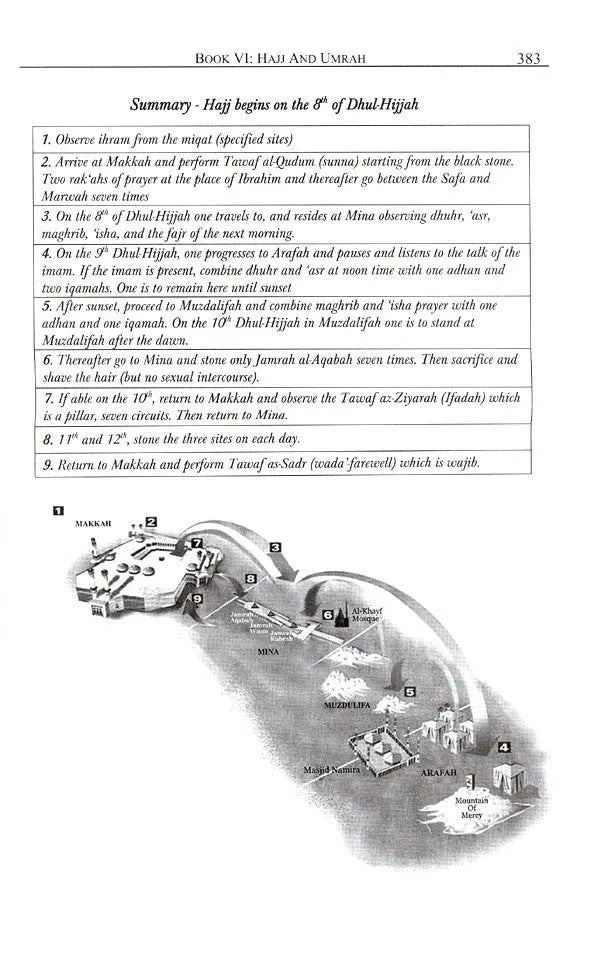Translated from the Arabic with Commentary and Notes by Wesam Charkawi
Nur al-Idah is a Hanafi text which includes vast areas of jurisprudence, namely, the rulings pertaining to worship. It leaves the student or general reader well prepared to deal with the majority of matters ranging from purification, prayer, funerals, zakat to hajj.
It reveals in a small way as to why the Hanafi Madhhab is held in such high esteem from scholars all over the world. It is practical, sensible and can be used as a reference book. This book is based on the teachings of Abu Hanifa and his students, namely Imam Muhammad, Abu Yusuf, and Zufar; and will provide the reader with a brief look as to why the Hanafi Madhhab is the most widely embraced in the world today.
Ahmad Ibn Hanbal said, "If in any matter there is an agreement between three people, then one pays no attention to the verdict of anyone who disagrees with them." Someone asked him, "Who are they?" He answered, "Abu Hanifa, Abu Yusuf and Muhammad Ibn al-Hasan."
The main Hanafi books, such as The Hashia of Ibn 'Abidin, al-Hidayah and al-Mabsut were referred to, as well as consultation from some of the most eminent scholars. The text also includes sample examination questions in an effort to help the reader view the laws in a different light and to enable him to deal with legal rules in a practical way.
About the book
The translation of Nur al-Idah is displayed in bold while the commentary and explanation, the majority of which is from Maraky al-Falah is written in plain text. It has been the translators attempt to prepare the text of Nur al-Idah in a manner that can be read independently without reading the commentary. However, the commentary is essential for further explanations of the actual text and for this reason it entails views from other Hanafi sources such as al-Ikhtiyar and al-Hidayah, as well as the position of other schools, such as the Shafi'i Madhhab. This is intended to give the reader a broader perspective on matters and demonstrate the similarity between the various schools of thought.
Referencing the text with evidence, namely, with Quran or hadith has been given on most issues and that areas where it is not, is either due to qiyas (analogical reasoning) or because of its unanimous agreement on that particular issue. A translation may simplify many things, though this will still require the complete and concentrated attention of the reader. Also, many examples and explanatory notes have been included. These are, for the most part intended to clarify what might otherwise have been an obscure or ambiguous passage in the original or as a result of the translation.
About The Author
Hasan Shurunbulali was born in a village in Upper Egypt in 994/1586, his father took him to Cairo at the tender age of six. He memorized the Qur’an and subsequently studied the Islamic sciences under numerous scholars, specifically Qur’anic recitation under Shaykh Muhammad al-Hamawi and Shaykh ‘Abd al-Rahman al-Masiri, and jurisprudence under Imam ‘Abdullah al-Nahriri, ‘Allama Muhammad al-Mahabbi, and Shaykh ‘Ali ibn Ghanim al-Maqdisi.
He then went to Azhar University, which at that time was the sanctuary for advanced students. He pursued higher education there and surpassed his peers, for he was foremost in his knowledge of juridical passages and maxims. Word spread of his rank and skill, and he eventually became one of the most renowned jurisconsults of the entire Muslim world. He assumed the post of professor at Azhar, whereby numerous aspiring students sat at his feet and benefited from his knowledge, many of whom themselves later developed into notable scholars of law.
These included, from Egypt, ‘Allama Ahmad al-’Ajmi, Sayyid Ahmad al-Hamawi, Shaykh Shahin al-Armanawi, and from the Levant, ‘Allama Isma’il al-Nablusi (father of the illustrious saint and jurist, Shaykh ‘Abd al-Ghani al-Nablusi). Moreover, the high demands and taxing lifestyle of his roles as professor, jurisconsult (mufti) and jurist, did not in the least take away from his occupation as writer. He authored over sixty works, ranging from the aforementioned two commentaries, as well as his distinguished Shurunbulaliyya, to numerous smaller treatises covering an array of specialized legal matters.
Upon visiting Cairo, one contemporary described him as follows: “[He is] the shining lantern of Azhar and its brilliant star . . . He gives life to eager minds . . . [and] possesses a beautiful character and magnificent eloquence . . . He is indeed the most extraordinary jurist of his age.” His departure from this lowly abode took place on a Friday after the ‘asr prayer, the 21st of Ramadan, in the year 1069/1659. He was approximately 75 years old. May Allah Most High envelop him with His infinite mercy. Amin.
When examining the Imam’s life and career, one readily notes a unique success afforded to him by Allah, as manifested in the extensive use of his written works by scholars and students in seminaries around the world. Historically, he is considered one of the finest scholars of the late Hanafi school with regard to his proficiency and expertise (malaka) in the field. Such an accomplishment can be attributed to a particular trait of the Imam, namely, sincerity (ikhlas).
He was a member of the Wafa’i order, a branch of the Shadhili path of Sufism, and had truly perfected his intention through his spiritual training and ethic. He not only possessed ikhlas, but as indicated by his agnomen Abu ’l-Ikhlas, he perfected it. He was “the father—or master—of sincerity.” This, then, could serve as the greatest lesson to be learned from the Imam; the believer must earnestly strive to attain unto perfect ikhlas in all his endeavors. As the esteemed Maliki jurist and saint Ibn ‘Ata’illah states in one of his famous aphorisms, “Actions are but erected forms; what gives them life is the presence of the secret of ikhlas in them.”
show more



























